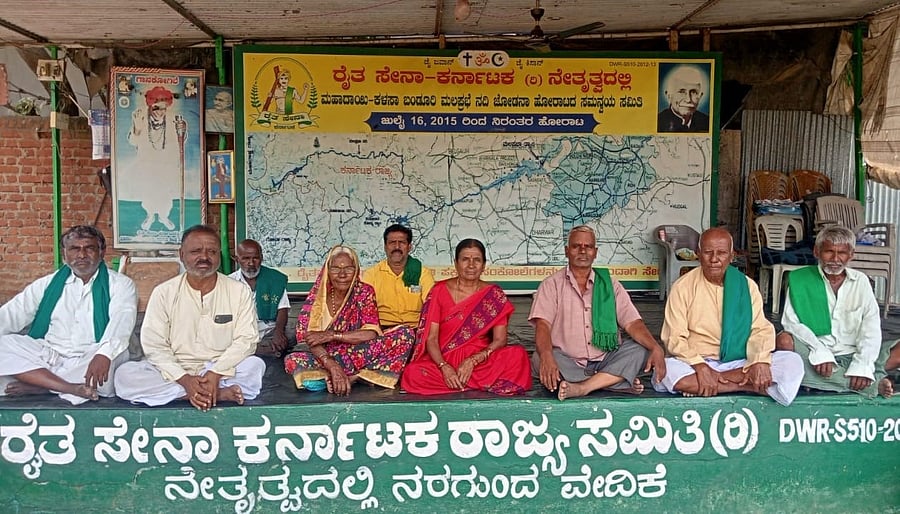
Farmers take part in an indefinite dharna at Nargund in Gadag district, which completes 10 years on Wednesday (July 16).
DH PHOTO/Basavaraj Halkurki
With resilience and determination to get Mahadayi water, farmers at Nargund and Navalgund, the land of farmers' rebellion in 1980 over the development levy issue which had changed the political equations in the state, have been staging an indefinite protest for the past 10 years. Despite facing police cases, lathi charge, criticism, groupism, splits, politicisation, disappointment, and assurances, their resolve remains unbroken. Although the intensity of the mass agitation has reduced over time, their struggle continues especially as water from the Kalasa and Banduri streams has yet to reach Malaprabha river.
After Mahadayi Water Disputes Tribunal (MWDT) was formed in 2010 amid the dispute between Goa and Karnataka over Mahadayi water sharing, the present stretch of indefinite strike by farmers began in Nargund of Gadag district on July 16, 2015. A similar dharna started at Navalgund in Dharwad district after 18 days, with the same purpose of getting water from Mahadayi tributaries to Malaprabha command area in 13 taluks of four districts. Since then, much water has flowed in Mahadayi and Malaprabha, protests at these two places have seen ups and downs, the agitation had spread to other areas across the state, becoming heterogeneous and people's own movement at times.
Whenever July 21 comes, when farmer martyrs day is observed in memory of Irappa Kadlikoppa and Basappa Lakkundi who died during farmers' revolt in Nargund and Navalgund respectively in 1980, Mahadayi issue comes to fore again.
The agitation reached its peak in 2015 and 2016. When the tribunal rejected the state's plea for interim relief in 2016, mob fury took place in Navalgund, followed by police action, and protests across the region. Later, the agitation gradually lost its intensity, though efforts like protests continued. Today, clearance from the National Board for Wildlife is required for the project after MWDT's 2018 award was gazette notified and CWC approved the DPR, while the state government claims it has done tender for the project.
'Farmers have clear picture'
Veeresh Sobaradmath, who heads Raitha Sena Karnataka's dharna at Nargund, says, farmers at Nargund sit daily on dharna voluntarily, drawing motivation from 1980 rebellion, knowing the clear picture about the water needed, and they themselves have to spend money for this apolitical agitation for the future of the next generation.
"We filed 23 cases including PILs, and this agitation has brought us the legal knowledge of making even Union of forest, environment and climate change a party in a PIL," he said.
Admitting that politicisation, division, and corruption efforts were made to spoil the agitation, Sobaradmath recalled.
A total of 80 bandhs were successfully observed in Navalgund during the peak of the struggle, recalled Subhashchandragouda Patil of Malaprabha Mahadayi Kalasa-Banduri Pakshateeta Raitha Horata Samiti of which the indefinite dharna completes 10 years in Navalgund next month.
"The very basic need of water makes people join the protest voluntarily. Even facing the obstacles like politics, selfishness and conspiracies, farmers with moral base consider this struggle as a 'Kayaka', we get motivation from 1980 rebellion, and we will continue the struggle," he noted.
For Shankarappa Ambali, who was earlier with Raitha Sena Karnataka, and has now formed his organisation, laments that persons with political affiliation and the issue used for politics, along with the fear created due to 'police cruelty' in 2016 reduced the intensity of the agitation, and still there are cases related to rail roko and other incidents on agitations.
'Issue is being politicised'
The demand for Centre's intervention, strong will and political understanding between states to resolve the issue has not been met, says Hubballi-based Mahadayi Kalasa-Banduri Horata Saanvaya Samiti convener Mahesh Pattar, adding that some teams getting politicised especially during elections, and lack of coordination between different committees resulted in the struggle losing the initial pace. In 2016, continuous bandhs and an almost one-year protest was staged in Hubballi also, as the project is also for drinking water for the twin cities.
"Though there were hundreds of protests, there was no single team to negotiate with the government. We will try again to achieve coordination through the inspiration of farmer martyrs' day this time," Pattar added.